The culinary world lost a great one this month with the passing of Chef Judy Rodgers, whose San Francisco restaurant, Zuni Café, was the at the forefront utilizing local and seasonal ingredients and shaping the way Americans think about and prepare food. No clever platings or dazzling feats of molecular gastronomy – just honest food, prepared perfectly. I have adapted this recipe to work on the grill from The Zuni Cafe Cookbook, which if you don’t already own, you should.
Porchetta is not a small undertaking – traditionally, a pig is gutted, the bones removed, the cavity layered with garlic, rosemary, fennel, meat, fat, and skin, and then all rolled up and roasted. You can see why this mock porchetta is way easier to handle, while giving you traditional flavors.
Not many people roast large cuts of meat any more and it’s a shame. This pork shoulder roast reminds me of the roasts my mom and grandma used to make. The fat cap turning into the caramel colored cracklin’ deliciousness that everyone would fight over. I had to stop myself from pulling it off and eating it before I took these pictures. 🙂 Note: this only gets better if you prepare it one to three days in advance of roasting so all the flavors of the fresh rub can permeate the roast.
Maybe I was feeling a bit nostalgic or maybe it was the beautiful colors of the food, but I took a bunch of pictures, so get ready to drool! BTW – this would be fantastic on your holiday table… Enjoy!
Zuni Café Inspired Mock-Porchetta
(adapted from The Zuni Café Cookbook)
serves eight to ten
One 4 to 4 1/2 pound boneless, pork shoulder roast
1 tablespoon capers, rinsed, pressed dry and lightly chopped
2 teaspoons chopped fresh sage
2 teaspoons finely chopped fresh rosemary
1 1/2 teaspoons finely grated orange zest
1/2 teaspoon finely grated lemon zest
1 teaspoon crushed red pepper flakes
1 tablespoon fennel seeds, lightly crushed, divided
2 teaspoon freshly ground black pepper, divided
Sea salt, 1/2 teaspoon per pound of meat
3 to 4 pounds of vegetables to roast, cut into chunks: I used peeled carrots, onions wedges, small potatoes, turnips, wedges of fennel bulb
Olive oil
1 1/2 cup chicken stock
A shot of dry sherry
Extras:
Flame-proof 12- to 14-inch skillet or roasting pan (optional)
Butcher’s twine
Method:
Indirect heat
 Have your ingredients prepped and ready.
Have your ingredients prepped and ready.
Trim away any unnecessary fat leaving a 1/4-inch fat cap. Check out the roast to see where natural separations of muscle are and with a sharp knife separate as much of the muscles as you can, leaving it intact as much as possible and without cutting the roast apart.
Combine the capers, herbs, zests, red pepper flakes, 2 teaspoons of the fennel seed and 1 1/2 teaspoon of the black pepper in a small bowl. Season the meat throughout with the salt and then rub the herb mixture in between where the muscles joined.
Gather and reassemble the roast back together and use the butcher’s twine to tie around the circumference and over the length of the roast to hold it in place. Secure every inch or so with more twine. Rub the outside with the remaining fennel seed and black pepper. Wrap with plastic wrap and let marinate in the refrigerator for 1 to 3 days (the longer, the better).
 Remove the roast an hour before you are ready to grill. Prep the vegetables while you set up and preheat your grill for indirect grill roasting over medium heat (about 350°F).
Remove the roast an hour before you are ready to grill. Prep the vegetables while you set up and preheat your grill for indirect grill roasting over medium heat (about 350°F).
If you are not using a flame-proof skillet or roasting pan, skip this next step. Place the pan directly over the flame and preheat the pan.
Once the pan is hot, move back to the indirect side and add the roast, fat-side up. Surround with the vegetables and close the grill.
After 1 hour, the roast should have some color (below). Working quickly so as not to loose too much heat, open the grill and turn over the meat so that it is fat-side down (this is where the magic starts to happen!). Stir the vegetables around and rotate the pan 180 degrees. Close the cover and roast another hour.
After 2 hours, your yard will smell start smelling delicious and your salivary glands will start to kick in as you open the grill to find (below) that you are not too far away from eating! Once again, flip the roast and stir the vegetables. Check the internal temperature to gauge your final cooking time. The roast is done when it reaches 185°F. Add half of the chicken stock and close the cover.
Somewhere between another 30 to 60 minutes, your roast will have reached 185°F. Remove the pan from the grill and transfer the roast to a cutting board and tent with foil. Use a slotted spoon to transfer the vegetables to a bowl and cover.
Skim the fat from the dripping and place the roasting pan over direct high heat (or transfer pan dripping to a saucepan) and add the remaining chicken stock and sherry. Scrape up all the browned bits and bring to a simmer for a couple minutes, then strain and set aside to serve. Remove the strings and slice the pork. Serve immediately with the roasted vegetables and pan sauce.
- One 4 to 4½ pound boneless, pork shoulder roast
- 1 tablespoon capers, rinsed, pressed dry and lightly chopped
- 2 teaspoons chopped fresh sage
- 2 teaspoons finely chopped fresh rosemary
- 1½ teaspoons finely grated orange zest
- ½ teaspoon finely grated orange zest
- 1 teaspoon crushed red pepper flakes
- 1 tablespoon fennel seeds, lightly crushed, divided
- 2 teaspoon freshly ground black pepper, divided
- Sea salt, ½ teaspoon per pound of meat
- 3 to 4 pounds of vegetables to roast, cut into chunks: I used peeled carrots, onions wedges, small potatoes, turnips, wedges of fennel bulb
- Olive oil
- 1½ cup chicken stock
- A shot of dry sherry
- Extras:
- Flame-proof 12- to 14-inch skillet or roasting pan (optional)
- Butcher's twine
- Trim away any unnecessary fat leaving a ¼-inch fat cap. Check out the roast to see where natural separations of muscle are and with a sharp knife separate as much of the muscles as you can, leaving it intact as much as possible and without cutting the roast apart.
- Combine the capers, herbs, zests, red pepper flakes, 2 teaspoons of the fennel seed and 1½ teaspoon of the black pepper in a small bowl. Season the meat throughout with the salt and then rub the herb mixture in between where the muscles joined.
- Gather and reassemble the roast back together and use the butcher's twine to tie around the circumference and over the length of the roast to hold it in place. Secure every inch or so with more twine. Rub the outside with the remaining fennel seed and black pepper. Wrap with plastic wrap and let marinate in the refrigerator for 1 to 3 days (the longer, the better).
- Remove the roast an hour before you are ready to grill. Prep the vegetables while you set up and preheat your grill for indirect grill roasting over medium heat (about 350°F).
- If you are not using a flame-proof skillet or roasting pan, skip this next step. Place the pan directly over the flame and preheat the pan.
- Once the pan is hot, move back to the indirect side and add the roast, fat-side up. Surround with the vegetables and close the grill.
- After 1 hour, the roast should have some color (below). Working quickly so as not to loose too much heat, open the grill and turn over the meat so that it is fat-side down (this is where the magic starts to happen!). Stir the vegetables around and rotate the pan 180 degrees. Close the cover and roast another hour.
- After 2 hours, your yard will smell start smelling delicious and your salivary glands will start to kick in as you open the grill to find (below) that you are not too far away from eating! Once again, flip the roast and stir the vegetables. Check the internal temperature to gauge your final cooking time. The roast is done when it reaches 185°F. Add half of the chicken stock and close the cover.
- Somewhere between another 30 to 60 minutes, your roast will have reached 185°F. Remove the pan from the grill and transfer the roast to a cutting board and tent with foil. Use a slotted spoon to transfer the vegetables to a bowl and cover.
- Skim the fat from the dripping and place the roasting pan over direct high heat (or transfer pan dripping to a saucepan) and add the remaining chicken stock and sherry. Scrape up all the browned bits and bring to a simmer for a couple minutes, then strain and set aside to serve. Remove the strings and slice the pork. Serve immediately with the roasted vegetables and pan sauce.
Cheers and Happy Grilling!
~ Jeff












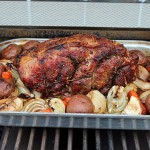
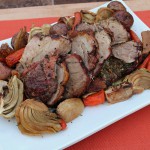
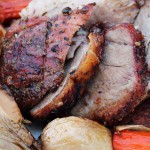
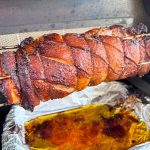


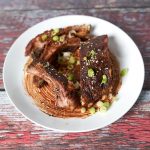

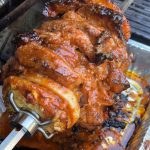
Now I’m convinced I need the Zuni cookbook (and a big thaw so I can unearth my grill)! Sounds delicious!
Anne – it was so delicious! You really should add The Zuni Cafe Cookbook to your library. It’s pretty amazing – both recipes and photos. Brush the snow off the top of that grill and fire it up! The rest will take care of itself (says the guy from SoCal)!